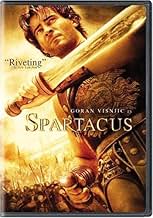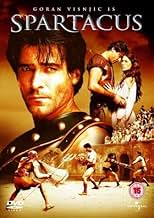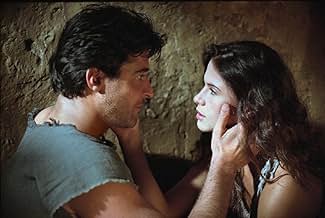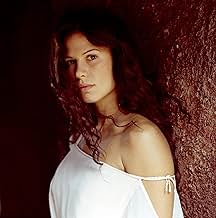IMDb RATING
6.6/10
5.9K
YOUR RATING
After he is bought by the owner of a Roman gladiator school and trained as a gladiator, a slave leads a rebellion of slaves and gladiators into revolt against Rome.After he is bought by the owner of a Roman gladiator school and trained as a gladiator, a slave leads a rebellion of slaves and gladiators into revolt against Rome.After he is bought by the owner of a Roman gladiator school and trained as a gladiator, a slave leads a rebellion of slaves and gladiators into revolt against Rome.
- Nominated for 1 Primetime Emmy
- 1 win & 7 nominations total
Browse episodes
Featured reviews
One of the previous reviewers, whose review garnered a "useful" label by 29 out of 29 people at the time of this writing, had the gall to correct the "thumbs up" vs "thumbs down" decision-making style of the gladiatorial arena.
This is the height of hubris. In reality, there is not a person alive today who truly knows what motion of the hand meant what in ancient Rome. The entirety of our knowledge of the "thumbs up" thing comes from a passage in a letter written in Latin where it is mentioned that at a recent gladiatorial game the writer had observed that the fate was decided in "the usual way" by means of "pressed thumb". Hollywood interpreted this as thumbs up vs thumbs down, but who the hell knows what it really means.
Where the previous author collected this notion of down meaning "spare him" and some kind of "stabbing motion" meaning "kill him" is completely mysterious and untrue. The arrogance with which he delivered the assuredly true claim forced me to correct him publicly, as his review of this film had been validated by 29 people, which by extension validated this fiction he perpetrates.
This is the height of hubris. In reality, there is not a person alive today who truly knows what motion of the hand meant what in ancient Rome. The entirety of our knowledge of the "thumbs up" thing comes from a passage in a letter written in Latin where it is mentioned that at a recent gladiatorial game the writer had observed that the fate was decided in "the usual way" by means of "pressed thumb". Hollywood interpreted this as thumbs up vs thumbs down, but who the hell knows what it really means.
Where the previous author collected this notion of down meaning "spare him" and some kind of "stabbing motion" meaning "kill him" is completely mysterious and untrue. The arrogance with which he delivered the assuredly true claim forced me to correct him publicly, as his review of this film had been validated by 29 people, which by extension validated this fiction he perpetrates.
Goran Visnjic gave a very credible performance as Spartacus. Instead of the superhero-style portrayed by Kirk Douglas (which I happened to LOVE that movie), Goran added more depth to the character ... the strengths AND the weaknesses. I also liked how the show developed his skills as a gladiator by having him do some real fighting rather than how it was done in the original.
Crassus (played by Angus MacFadyen) was likewise very three-dimensional. It was a shame that the movie was only 2 hours long (4 hours if you count the commercials). Given more time, it would have been enjoyable to see more of Crassus's political maneuvering. If that character had been born in our century, he'd be king of our country by now.
And there were surprisingly strong performances by others in bit-parts, like George Calil as Pompey, Ben Cross as Glabrus, and Henry Simmons as Draba. You can see that they did their homework and put real work into their character developments.
All in all, I give it an '8'. I'd like to give it a higher score, but I thought that the fight scenes were less than spectacular. Add a few thousand more stand-ins and maybe it would have been more believable. But I just didn't get the sense of volume that should have been there.
Crassus (played by Angus MacFadyen) was likewise very three-dimensional. It was a shame that the movie was only 2 hours long (4 hours if you count the commercials). Given more time, it would have been enjoyable to see more of Crassus's political maneuvering. If that character had been born in our century, he'd be king of our country by now.
And there were surprisingly strong performances by others in bit-parts, like George Calil as Pompey, Ben Cross as Glabrus, and Henry Simmons as Draba. You can see that they did their homework and put real work into their character developments.
All in all, I give it an '8'. I'd like to give it a higher score, but I thought that the fight scenes were less than spectacular. Add a few thousand more stand-ins and maybe it would have been more believable. But I just didn't get the sense of volume that should have been there.
There's some confusion about this Spartacus miniseries and the 1960 epic movie Spartacus. The stories are very similar because they both use the Howard Fast novel as a basis. The Kirk Douglas movie had another mission though as it was one of a group of movies made to regain the public's interest in the cinema with lavish spectacle. The scale of its production is much higher than the miniseries. What the miniseries has going for it is more historical accuracy; the gladiator/rebel army marched up Italy, got to the Alps and changed its mind (very puzzling), marched down to Italy's toe hoping to escape by boat but was foiled and was trapped for a time. They broke out only to quarrel amongst themselves and break up into at least two groups. This proved their undoing as the Romans first massacred the smaller group of Gauls and then defeated Spartacus in turn. Spartacus' body was never identified, but many were crucified along the road all the way to Rome. Spartacus and his army made the Romans pay in much blood and defeat leading up to his and their ultimate defeat, though, requiring 15 or 16 legions to chase them down. Spartacus is a favorite hero of the Communists, BTW, being the working stiff rising up against the ruling class, etc...
The 1960 epic is short on accuracy, instead showing the rebel army defeating the garrison of Rome and another legion or 3 along the way to Brundusium, only to turn back and get overwhelmed by multiple Roman armies. It was a closer match to the actual scale of events, as the rebels numbered around 90-100,000. But they both have the same love story tacked on along with treachery in the Roman Senate by ahistorical Roman Senators, and a Crassus obsessed with possessing the strength of Spartacus by possesing his woman.
The 1960 remains my favorite version simply because its a well-done big movie (I wouldn't want to be the one to reprise Olivier's Crassus!)although it was good to see a more accurate portrayal of the course of events shown in the miniseries. The acting was pretty good, with Spartacus' Visnjic a good choice for the title role.
The 1960 epic is short on accuracy, instead showing the rebel army defeating the garrison of Rome and another legion or 3 along the way to Brundusium, only to turn back and get overwhelmed by multiple Roman armies. It was a closer match to the actual scale of events, as the rebels numbered around 90-100,000. But they both have the same love story tacked on along with treachery in the Roman Senate by ahistorical Roman Senators, and a Crassus obsessed with possessing the strength of Spartacus by possesing his woman.
The 1960 remains my favorite version simply because its a well-done big movie (I wouldn't want to be the one to reprise Olivier's Crassus!)although it was good to see a more accurate portrayal of the course of events shown in the miniseries. The acting was pretty good, with Spartacus' Visnjic a good choice for the title role.
The TV miniseries opens in Gaul 72 B.C. where the Romans put an end to Varinia's world making her a slave
Meanwhile Spartacus (Goran Visnjic) is free from the hell of the gold mines of Egypt to be trained as gladiator in the establishment of Lentulus Batiatus (Ian McNeice).
Most of "Spartacus" contains many of the miniseries' best moments The operation of the gladiatorial school and its training program is impressive and expressive; the apprentice gladiators are treated like special animals, tutored to perform in the arena as spectator-sport-killers, and occasionally rewarded with a woman in their cells
In this degrading manner Spartacus meets Varinia (Rhona Mitra) and it is his love for her and his hatred for his captors that brings about his decision to escape and lead revolt
Particularly effective is the scene in which Marcus Crassus (Angus Macfadyen) and his bored entourage visit the establishment and request for a private showing at its best of a pair of Thracians Crassus wanted to see courage, passion, and above all finality
Spartacus is matched with the African Draba in a fight to the death, but Draba (maybe rather than live as a beast) chooses to die as a man, attacking his spectators
The scene summarizes the iniquity of the situation, the cruelty of bondage, and the subsequent uprising of gladiators in Capua becomes a triumph easy to understand
Director Robert Donrhelm did a decent job, carrying the grandeur and the decay of ancient Rome
Most of "Spartacus" contains many of the miniseries' best moments The operation of the gladiatorial school and its training program is impressive and expressive; the apprentice gladiators are treated like special animals, tutored to perform in the arena as spectator-sport-killers, and occasionally rewarded with a woman in their cells
In this degrading manner Spartacus meets Varinia (Rhona Mitra) and it is his love for her and his hatred for his captors that brings about his decision to escape and lead revolt
Particularly effective is the scene in which Marcus Crassus (Angus Macfadyen) and his bored entourage visit the establishment and request for a private showing at its best of a pair of Thracians Crassus wanted to see courage, passion, and above all finality
Spartacus is matched with the African Draba in a fight to the death, but Draba (maybe rather than live as a beast) chooses to die as a man, attacking his spectators
The scene summarizes the iniquity of the situation, the cruelty of bondage, and the subsequent uprising of gladiators in Capua becomes a triumph easy to understand
Director Robert Donrhelm did a decent job, carrying the grandeur and the decay of ancient Rome
This was beautifully acted and when it was over I wanted more! However when the ending credits started to roll I was disgusted to see that Goran Visnijic's name was spelled Goren. Okay if you misspell Visnijic that's one thing but how hard is Goran? That seems awfully disrespectful and unprofessional. Where are the editors? There was a reminiscence of Braveheart especially since "Robert the Bruce" was opposite Goran for the spotlight here. And who could've missed the famous battle cry of "FREEDOM" when it was shouted? I loved Braveheart, I loved Spartacus and, what can I say I love Goran Visnijic. I think it's important these days to try and adequately and accurately portrait history's important events using television and movies because our children almost depend on it as a source of information. Using special effects and quality actors is a good start, thumbs up, but please fix your misspelling.
Did you know
- TriviaA noticeable piece of dramatic license has Spartacus' son born exactly at the moment Spartacus dies in battle. As Marcus Crassus and Pompey Magnus are proclaimed co-consuls, the announcer calls Rome an empire, when it was still a republic at the time.
- GoofsWhen Spartacus is about to cut Crixus's throat, the fillings in Crixus's mouth are visible.
- ConnectionsRemake of Spartacus (1960)
- How many seasons does Spartacus have?Powered by Alexa
Details
- Runtime1 hour 27 minutes
- Color
- Aspect ratio
- 1.78 : 1
Contribute to this page
Suggest an edit or add missing content





































